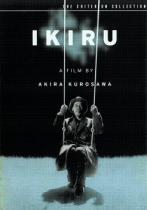Ikiru
 Year:
Year: 1952
Film Studio: Toho
Genre: Drama, Classic
Length: 143 Min.
Director Akira Kurosawa (1910)
Writer Shinobu Hashimoto (1918)...Writer
Akira Kurosawa (1910)...Writer
Hideo Oguni (1904)...Writer
Producer Sôjirô Motoki
Cinematographer Asakazu Nakai (1901)
Music Fumio Hayasaka (1914)...Composer
StarsTakashi Shimura (1905) as Kanji Watanabe
Shinichi Himori (1907) as Kimura
Haruo Tanaka (1912) as Sakai
Minoru Chiaki (1917) as Noguchi
Miki Odagiri (1930) as Toyo Odagiri, employee
Bokuzen Hidari (1894) as Ohara
Minosuke Yamada as Subordinate Clerk Saito
Kamatari Fujiwara (1905) as Sub-Section Chief Ono
Review In a span of just five years, Akira Kurosawa completed three genuine masterpieces,
Rashômon,
Ikiru, and
Seven Samurai. Films as influential as these would be considered lifetime achievements in most director’s canons, yet Kurosawa had many more masterpieces to follow and by the end of his life, he would be seen by many (myself included) as the greatest director of all time.
Ikiru would be Kurosawa's most poignant and poetic film as he delves into the dilemma facing a man who learns that he suffers from in-operable cancer and that the malignant tumor in his stomach will shortly take his life.
Takashi Shimura stars as Watanabe, an aging bureaucrat in Tokyo government whose life has been a repetitive process of number crunching and paper pushing. He is proud of the fact that he has never missed a day of work at his mundane job in over thirty years. Yet when he learns of his fate, Watanabe decides that his life has had no meaning and after removing all of his life’s savings from the bank, starts to partake in the pleasures of drink, dance halls and pachinko parlors. This leaves him un-fulfilled and he searches for another avenue to give his life some meaning. When a young female assistant from his office appears at his home to acquire his signature on the form that will allow her to leave her job, he takes her out on the town hoping that a little of the spark that she displays, will rub off on him.
When after a few days, she starts to get apprehensive of the attention he is showing, she rebuffs him and Watanabe has an epiphany. A man’s legacy is left with the people whom his life has touched and he decides to champion a cause which the bureaucracy in Tokyo has thwarted. Earlier in the film, a small group of women had approached the government about building a small park for their children in the slum where they lived. As they are sent on an endless parade to the various offices that give them the runaround, Kurosawa shows the frustration and desperation that Watanabe will soon endure as he hurries to get the park built before he dies. Humbling himself before various stubborn or shallow bureaucrats not unlike himself, his tireless efforts are finally met with success as the park is completed and his legacy is achieved.
In the final moments of the film, in one of the most heartwarming and beautiful moments in film history, Watanabe is sitting on a child’s swing in the midst of a light snowfall, singing a melancholy song as he sways back and forth. The look of inner peace on his face is a testament to his acceptance of his fate and prepares the viewer for what is to come. When it is learned that Watanabe succumbs to the elements that night and passes away in the park, we are not left with a feeling of pity, but with understanding and compassion. Through Watanabe we can see in ourselves the despair and trauma of terminal illness and the realization of a life wasted on meaningless tasks and ventures. When we focus our life’s attention away from materialistic acquisitions and follow the path of self-sacrifice in the name of community, no life is insignificant.
What separates
Ikiru from the rest of the films that deal with similar subject matter, is the way the structure of the story is laid out for the viewer. Once again, as with
Rashômon, Kurosawa takes standard schemes of storytelling and creates a narrative tapestry that weaves the plot in a most unconventional manner for the time. Instead of showing Watanabe progressively wasting away before the viewer’s eyes as the film advances, Kurosawa kills him off at the halfway point, and finishes the film in snippets of flashback told by witnesses to his actions, at Watanabe’s wake. This approach helps to drive home the point that Watanabe is fighting a losing battle with his health, but in return, is slowly winning his war against the bureaucracy that he was so entrenched in, for most of his life.
In the hands of any other actor, the role of Watanabe would probably have seemed maudlin or cloying, but in Takashi Shimura, Kurosawa found the right balance of subtlety and intensity. Shimura's performance as Watanabe is somber, sullen and in the end revitalizing. If foreign actors had been recognized in Hollywood during this time, he surely would have taken home the Best Actor Oscar for that year. Without a doubt, this is a film that should be seen by any true lover of cinema.
Ratings Criterion5 Stars - The pinnacle of film perfection and excellence.4 ½ Stars - Not quite an immortal film, yet a masterpiece in its own right.
4 Stars - Historically important film, considered a classic.
3 ½ Stars - An entertaining film that’s fun or engaging to watch.
3 Stars – A good film that’s worth a Netflix venture.
2 ½ Stars - Borderline viewable.
2 Stars – A bad film that may have a moment of interest.
1 ½ Stars – Insipid, trite and sophomoric, and that's its good points.
1 Star – A film so vacuous, it will suck 2 hours from the remainder of your life.
½ Star - A gangrenous and festering pustule in the chronicles of celluloid.